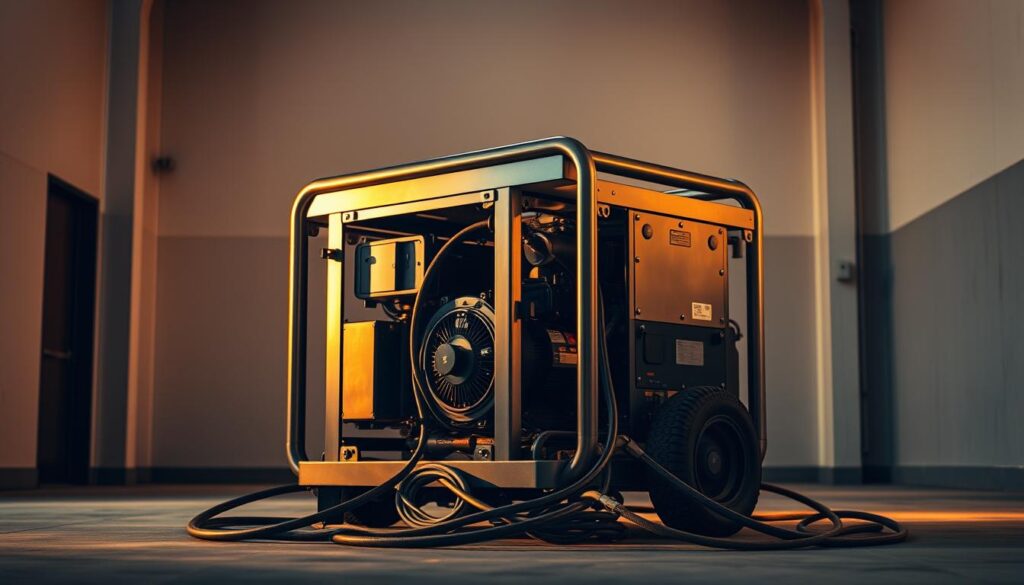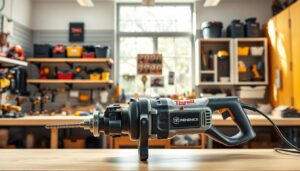Are you prepared for the next power outage to hit your home?
In an age where electricity is the lifeblood of our daily lives, power disruptions can be particularly inconvenient and even pose safety risks. Whether it’s a sudden storm, a technical glitch, or a planned maintenance outage, having a reliable backup generator can be a lifesaver.
This comprehensive guide will help you navigate the world of backup power solutions for your home, providing essential information to make an informed purchase decision.
Key Takeaways
- Understand the different types of backup power solutions available for your home.
- Learn how to choose the right generator for your specific power needs.
- Discover key features to consider when selecting a backup power solution.
- Find out how to ensure safe installation and maintenance of your backup power system.
- Get insights into top recommended models available in the UK market.
Understanding Portable Generators for Power Outages
To navigate the complexities of power outages, it’s vital to comprehend the role of portable generators. These devices are designed to provide power when the main electrical supply is unavailable, ensuring that your home remains functional.
What is a Portable Generator?
A portable generator is a self-contained unit that generates electrical power using an internal combustion engine or a battery. Unlike standby generators, portable models are designed to be moved and used as needed, making them ideal for temporary or emergency power solutions. They can be powered by various fuel sources, including petrol, diesel, or LPG, and some models use rechargeable battery packs.
How Portable Generators Work
Portable generators operate on a straightforward principle: they convert mechanical energy into electrical energy through electromagnetic induction. The internal combustion engine burns fuel to create mechanical energy, which then turns an alternator to generate electrical current. Modern inverter generators refine this process further, producing “clean” power suitable for sensitive electronics. Alternatively, portable power station models use stored electrical energy in battery packs, offering a quieter and more environmentally friendly source of power.
Types of Portable Generators Available in the UK
Portable generators available in the UK can be categorized into several types based on their power source and functionality. This categorization helps you choose the most suitable generator for your specific needs, whether it’s for home use during power outages or for outdoor activities.
Petrol Generators
Petrol generators are a popular choice due to their widespread availability and relatively low cost. They are suitable for a variety of applications, from home backup power to outdoor events. Typically, they offer a reliable source of power, but it’s essential to consider factors like noise levels and fuel efficiency.
- Advantages: readily available fuel, generally affordable upfront cost
- Disadvantages: noise, emissions, maintenance requirements
Diesel Generators
Diesel generators are known for their durability and efficiency, making them a good option for heavy-duty or prolonged use. They tend to be more fuel-efficient than petrol generators, especially for larger power requirements. However, they may have a higher initial cost and can be noisier.
Battery-Powered Generators
Battery-powered generators, or portable power stations, offer a clean and quiet alternative. They are ideal for smaller power needs and can be recharged via various means, including solar panels and wall outlets. This flexibility makes them particularly useful for outdoor activities or during power outages.
Solar Generators
Solar generators combine portable power stations with solar panels, creating a renewable energy system. They are environmentally friendly, producing zero emissions, and can be a cost-effective solution for smaller power requirements. 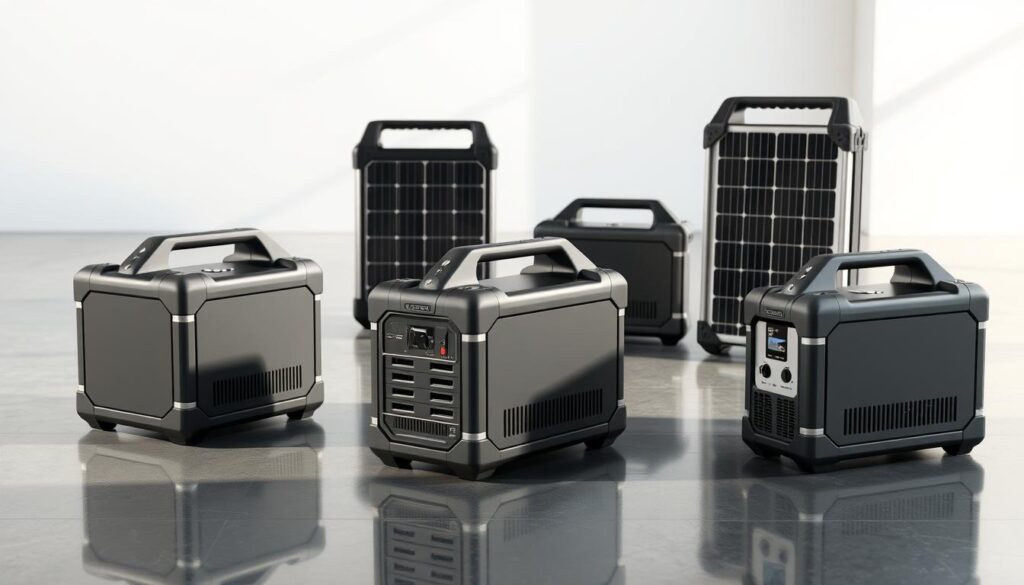 The efficiency of solar generators depends on sunlight availability, but many models offer hybrid charging options, allowing for recharging from mains electricity when needed.
The efficiency of solar generators depends on sunlight availability, but many models offer hybrid charging options, allowing for recharging from mains electricity when needed.
- Key benefits: zero emissions, minimal maintenance, potential cost savings
- Considerations: dependency on sunlight, charging time
Choosing the Right Size Portable Generator for Your Needs
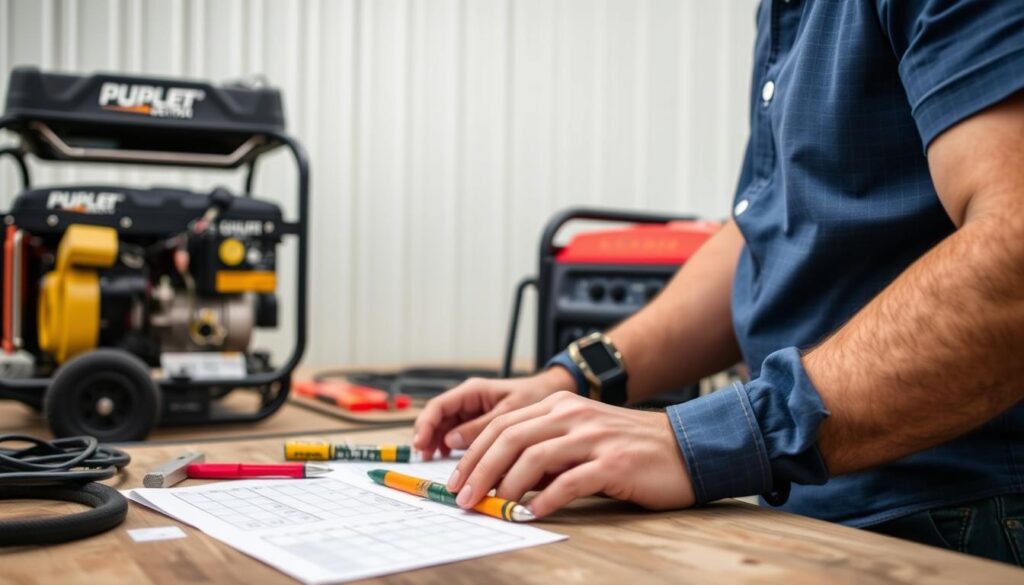
To ensure you have the right power backup, understanding how to choose the correct size portable generator is essential. The size of the generator you need depends on the power requirements of your home during an outage.
Understanding Wattage Requirements
Understanding the wattage requirements of your appliances is crucial. Different appliances have different power needs, and calculating these needs will help you choose a generator that can supply enough power.
Starting vs Running Wattage
It’s essential to differentiate between starting wattage and running wattage. Starting wattage is the power required to start an appliance, while running wattage is the power needed to keep it running. For instance, a refrigerator might require 2200W to start but only 700W to run.
Common Household Appliance Power Requirements
Various household appliances have different power requirements. Lighting circuits typically require between 200-500W, while refrigerators need 100-700W running and 2,000-2,200W starting. Heating appliances like electric heaters use 1,000-2,000W, and kitchen appliances such as microwaves use 600-1,200W.
By understanding these requirements, you can calculate the total power needed to run your essential appliances during an outage, ensuring you choose a generator that meets your needs.
Key Features to Consider When Buying Portable Generators for Outages UK
When selecting a portable generator for power outages in the UK, several key features must be considered to ensure you make the right purchase. These features not only affect the performance and efficiency of the generator but also its safety and usability.
Noise Levels
The noise level of a portable generator is a crucial factor, especially if you plan to use it in residential areas or during camping trips. Look for generators with lower decibel ratings, typically around 60-70 dB, which are considered relatively quiet. Some models come with noise-reducing features or are specifically designed to be quieter.
Portability and Weight
Since these generators are designed to be portable, their weight and size are significant considerations. Lighter models with compact designs are easier to transport and store. However, they should also be sturdy enough to withstand outdoor conditions. Consider generators with built-in handles or wheels for enhanced portability.
Run Time and Fuel Efficiency
The run time of a generator is determined by its fuel tank capacity and fuel efficiency. Generators with larger fuel tanks or those that are more fuel-efficient can run for longer periods without needing a refill. This feature is particularly important during extended power outages. Always check the manufacturer’s specifications for run time and fuel consumption.
Safety Features
Safety features are paramount when selecting a portable generator. Key safety features include:
- Low-oil shutdown protection to prevent engine damage.
- Overload protection circuits to safeguard against excessive power draw.
- Ground fault circuit interrupter (GFCI) outlets to protect against electrical shocks.
- Carbon monoxide detection and automatic shutdown to prevent CO poisoning.
These features significantly enhance the safety of using a portable generator, especially in enclosed or poorly ventilated areas.
Fuel Types and Efficiency Comparison
When selecting a portable generator for power outages in the UK, understanding the different fuel types and their efficiency is crucial. The right choice can significantly impact your power supply during emergencies and your overall running costs.
Petrol vs Diesel Efficiency
Petrol generators are common due to their lower initial cost, but they typically cost £0.40-£0.60 per kilowatt-hour (kWh) to operate. In contrast, diesel generators offer better efficiency with operating costs around £0.30-£0.45 per kWh, despite higher purchase costs. For more detailed information on the best fuel type for generators, you can visit Bellwood Rewinds.
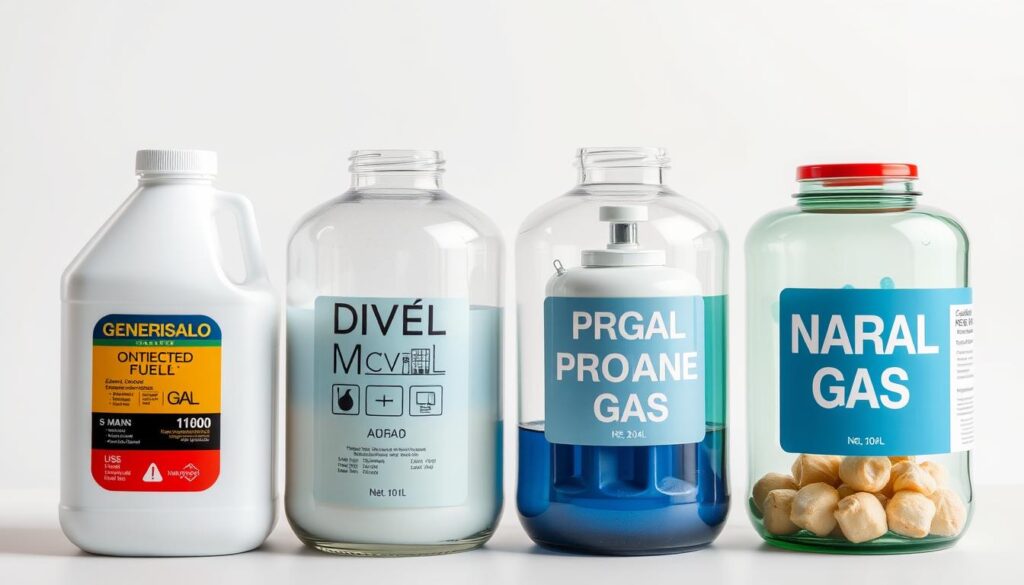
Alternative Power Sources: LPG and Solar
LPG generators run at approximately £0.35-£0.50 per kWh, offering cleaner operation and longer fuel tank life. Solar generators, on the other hand, have essentially zero running costs once purchased, although they require sufficient sunlight and typically offer lower power output.
Running Costs Comparison
Understanding the running costs is essential. Battery power stations cost £0.10-£0.15 per kWh to charge, making them economical, while solar generators have zero running costs but higher initial investment. Maintenance costs, including oil changes and component replacements, should also be considered when choosing a generator.
Top Recommended Portable Generators for UK Power Outages
We’ve researched and compiled a list of the best portable generators for UK power outages, ensuring you have the right backup power when you need it most.
Champion 500560-UK
The Champion 500560-UK is a robust 3500W generator, offering reliable power for your home or outdoor activities. With a run time of up to 11 hours, it’s perfect for extended power cuts.
Anker Solix C300X
The Anker Solix C300X is a versatile power solution, suitable for a variety of applications. Its compact design and capacity make it an excellent choice for backup power.
Impax Suitcase Inverter Generator
This Impax generator is known for its portability and fuel efficiency, making it ideal for both home use and outdoor adventures.
maXpeedingrods Portable Inverter Generator
The maXpeedingrods generator offers a high output and is designed for durability, ensuring it can handle demanding applications.
Dewalt Dual Voltage Generator
Image of Dewalt Dual Voltage Generator
The Dewalt Dual Voltage Generator is a petrol-powered unit with a 3500W power output. It features a 20-litre fuel tank, providing up to 11.6 hours of run time at 50% load. This generator is built for demanding applications and includes features like automatic low-oil shutdown and voltage regulation.
- Offers robust 3500W power output with dual voltage capability.
- Designed for harsh environments and construction sites.
- Substantial 20-litre fuel tank for extended run time.
- Includes professional-grade features like OHV engine and circuit breaker protection.
- Automatic low-oil shutdown technology protects the engine.
Where to Buy Portable Generators in the UK
The UK market offers numerous avenues for buying portable generators. You can find them through various online retailers, physical stores, and specialist suppliers, as well as hire them for temporary use.
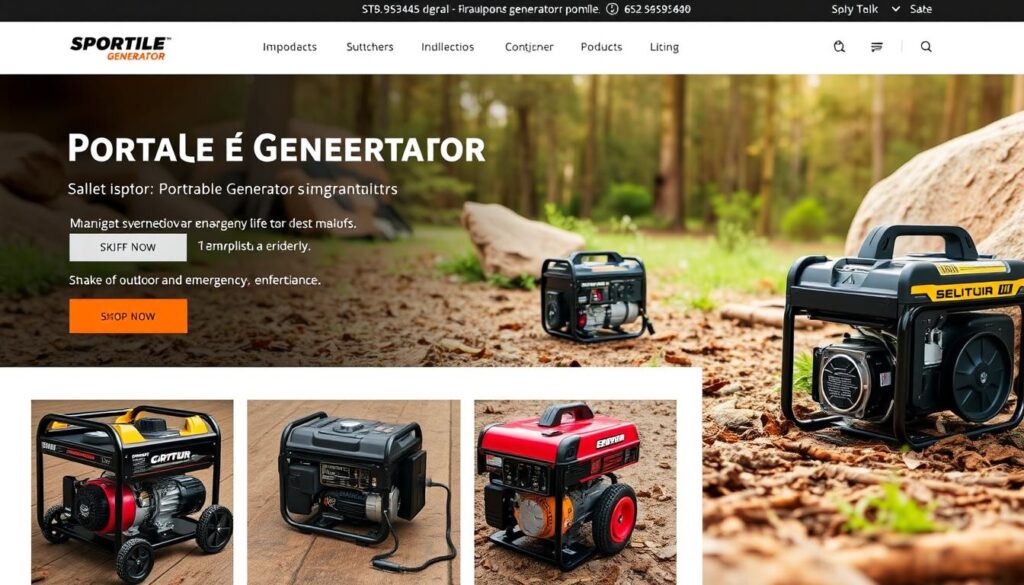
Online Retailers
Online retailers offer a convenient way to purchase portable generators. You can compare different models, read reviews, and have the generator delivered to your doorstep. Popular online retailers include Amazon, eBay, and Argos.
Physical Stores and Specialist Suppliers
If you prefer to see the product before buying or need expert advice, physical stores and specialist suppliers are a good option. Retailers like Wickes, B&Q, and specialist generator suppliers offer a range of portable generators. You can visit their stores to get a closer look and discuss your needs with knowledgeable staff.
Generator Hire Options
For those who need a portable generator for a short period, hiring is a cost-effective alternative. Companies like HSS Hire and Jewson offer generator hire services. HSS Hire provides a 1.6kVA portable generator for around £76 per day, while Jewson’s cheapest option is a 2.7kVA generator for approximately £42 for the first day.
Maintenance and Care Tips for Your Portable Generator
Proper maintenance of your portable generator is crucial for its longevity and performance during power outages. Regular checks and proper care ensure that your generator is always ready to provide the power you need.
Regular Maintenance Schedule
To keep your portable generator in optimal condition, follow a regular maintenance schedule. This includes checking the oil level, inspecting the air filter, and ensuring the spark plug is in good condition. Regularly checking these components can prevent unexpected failures during critical times.
| Maintenance Task | Frequency |
|---|---|
| Oil Level Check | Before Each Use |
| Air Filter Inspection | Every 10 Hours |
| Spark Plug Check | Every 50 Hours |
Storage Recommendations
When storing your portable generator, ensure it is in a dry, well-ventilated area. For petrol generators, use a fuel stabilizer to prevent fuel degradation. Battery-powered generators should have their batteries charged periodically to maintain health.
Troubleshooting Common Issues
Understanding how to troubleshoot common issues with your generator can save valuable time. Check for insufficient fuel, stale fuel, low oil levels, or a dead battery if your generator won’t start. For generators that start but fail to stay running, inspect the fuel cap vent and fuel line for restrictions.
Conclusion: Is a Portable Generator Worth the Investment?
Investing in a portable generator can offer peace of mind, especially for those with critical electricity needs. When deciding whether to purchase a portable generator, it’s crucial to consider the frequency and duration of power outages in your area against the initial cost and ongoing maintenance of the equipment.
For UK residents in rural areas or regions prone to weather-related outages, a generator provides essential backup power for critical systems, potentially preventing significant inconvenience or danger. The financial calculation extends beyond the purchase price to include fuel costs and potential savings from preventing food spoilage or accommodation costs during extended outages.
Beyond emergency use, many generators offer versatility for various activities, extending their utility beyond rare power cuts. Alternative solutions like battery power stations with solar charging capability offer lower-maintenance options, though typically with less power capacity.
Ultimately, a portable generator represents an insurance policy against power disruption—the value of which depends on your personal circumstances and the potential impact of power loss on your household’s safety and comfort.
